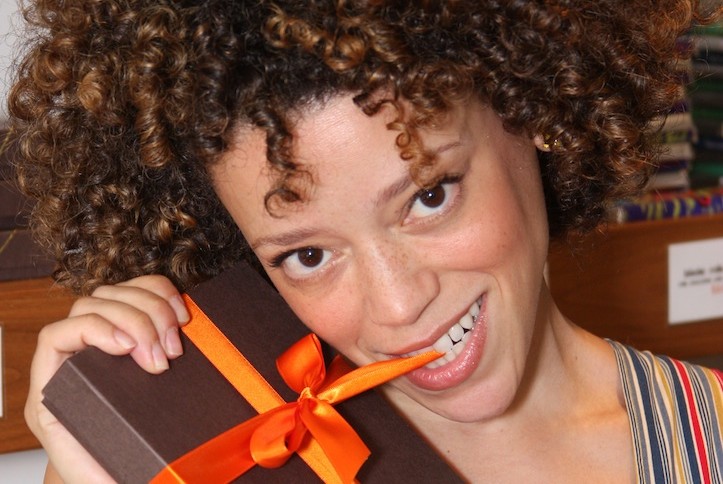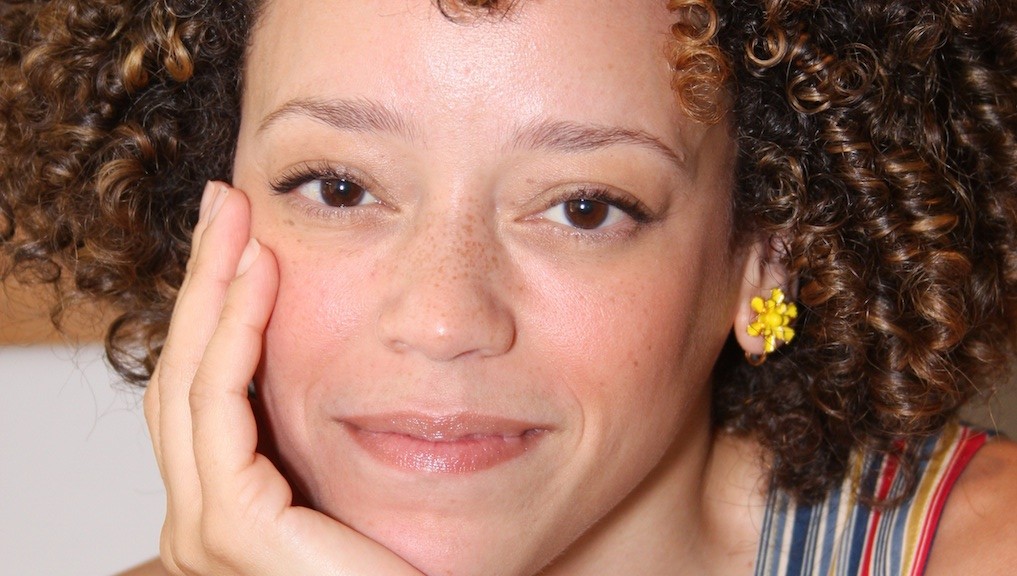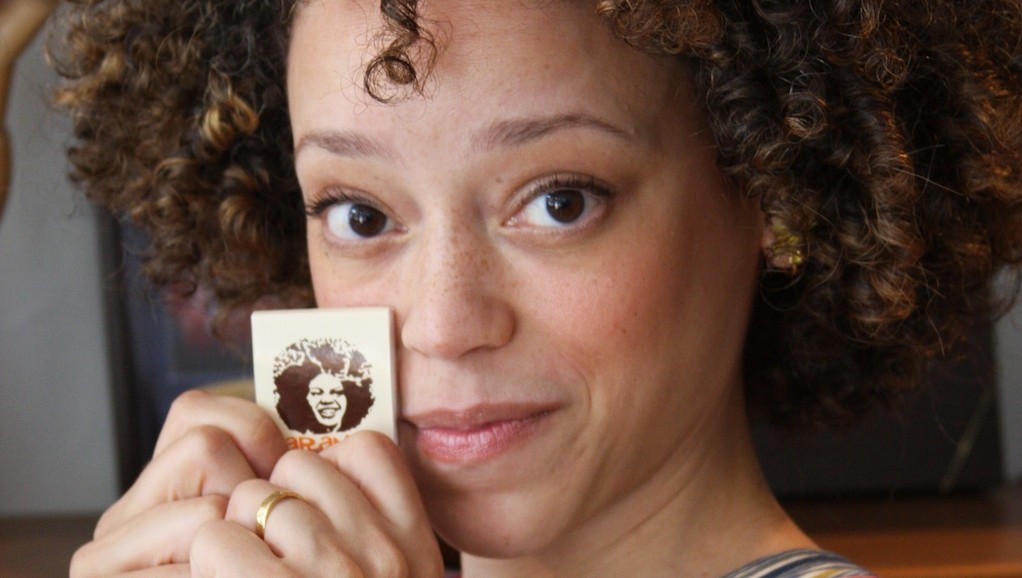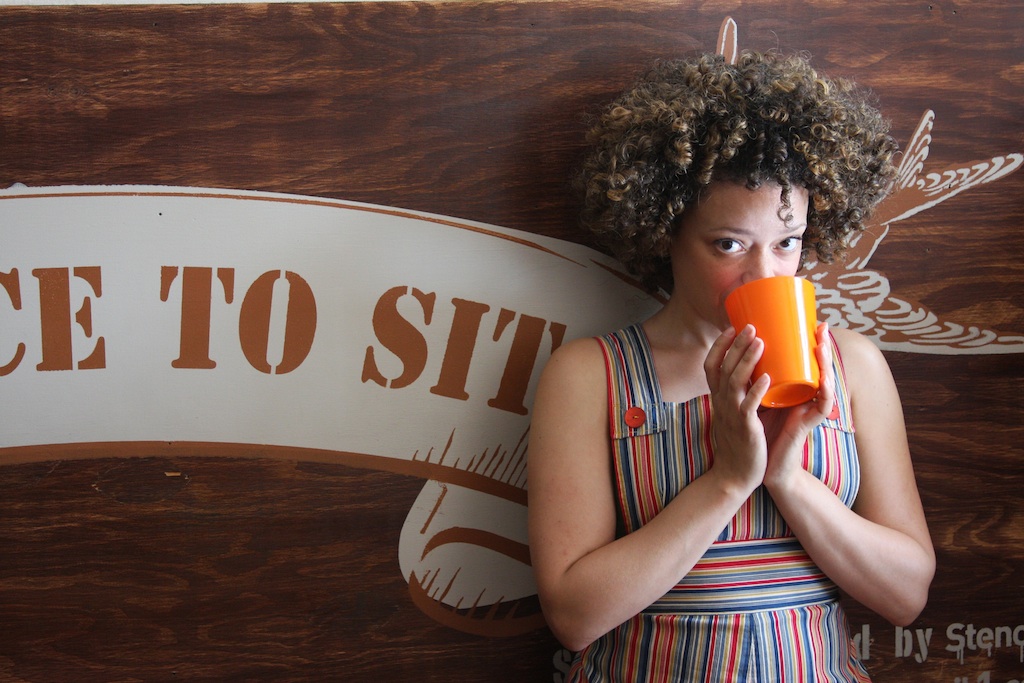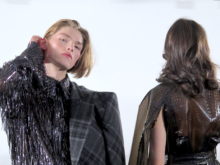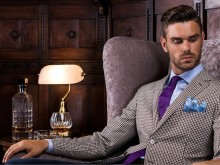Anyone who’s ever seen Marcy Harriell on stage, television, or the silver screen, knows how she illuminates the space around her. During her two-year run playing Mimi in the Pulitzer Prize-winning production of Rent, the New York Times called her “incandescent.”
This is a woman who lights up every room she enters. Witness what happens when she walks into a restaurant to meet us for an interview: a neighboring table of three suits can’t stop staring, until, finally, one callow fellow ventures nearer. Never once does Harriell cease smiling as she breaks the news of her husband to her ardent admirer.
Currently the female lead in the Tony-award winning production of In the Heights in which she stars opposite High School Musical heartthrob Corbin Bleu and American Idol-ist Jordin Sparks, Harriell has been bringing Broadway audiences to their feet since her turns in Rent and Lennon, while her critically-acclaimed performances on television series such as Ed and Queens Supreme have earned her fans across the country.
Apart from her coloratura soprano with its rear-mezzanine reach, Harriell has been celebrated for both her comedic chops and her fashion sense, both of which were strikingly in evidence when she joined us for lunch at Café Cluny in New York’s West Village.
Having returned to Manhattan after a three-year stint in Los Angeles, Harriell talked with us about her numerous comely male co-stars, working with Quentin Tarantino, the origins of her personal style, and the differences between stage, film and television.
MRNY: Tell us who you’re wearing today.
MARCY: Actually, I’m wearing something I created myself – from a vintage Vogue pattern. It’s a vintage jumper that doubles as a sun-dress, with nice deep pockets for…whatever it is the Vogue lady does during the day. [laughing]
MRNY: Um, probably shopping, right? And speaking of, where are your Mimi boots taking you these days for something cheap and cheerful?
MARCY: Okay, Forever 21 is ridiculous. It’s perfect for something quick and trendy.
MRNY: And Biblical, too, apparently. Did you know they print a Biblical verse on the bottom of their shopping bags? Where else?
STYLE MAVEN MARCY
MARCY: I’ve gone off Conway for now. For vintage, I love Reminiscence on 23rd Street. Vintage is in the back. I found this vintage suede skirt.
MRNY: We saw you in one particularly stunning dress for the opening of Lennon. Designer favorites?
MARCY: Anna Sui. Michael Kors. That shouldn’t be a shocker. Everyone should be in love with Michael Kors.
MRNY: You’ve got the fashion gene – like certain gay men.
MARCY: My husband said, “Do you ever think about Project Runway? You could do it, babe.” The challenges are really cool.
MRNY: Calling Tim Gunn right now. They should do that: get Broadway stars to whip up a costume, because theatre people know how to work an outfit. They’re always hanging around costume departments.
MARCY: I made a gown for a gala for one of the dancers in the show. Three solid weeks’ of work.
MRNY: We’ve heard that you used your elementary school hallways as a catwalk, parading up and down in your own ensembles. How did your personal style develop?
MARCY: My style developed from my parents. They always taught me really not to care about what anyone else thought, at all – but to care enough about what I thought. So that I would look like I cared about myself. Does that make sense?
MRNY: Completely. Very cool parents.
MARCY: So I took that attitude into fashion, into what I wore. I was very opinionated and very loud. I wanted everyone to know that, just by looking at me, to know that I didn’t care [what they thought]. So yeah, lace pants… [laughing]
MRNY: [laughing] Who were your fashion icons when you were coming up?
MARCY: Prince. Definitely Prince. Yeah.
MRNY: You would look at his shoes, right?
MARCY: Well, it’s hard for a junior high school girl to be wearing the platform boots with the four-inch heels, but I could find the lace shawls and pants. And I’d wear the bandannas above the eyes. And a star and a lightning bolt on my face! I told you about that, right?
MRNY: Not yet you haven’t.
MARCY: At the local drugstore, I found a little kit with like five different oil colors in it. You would paint the stamp and then stamp it on your face. Then every day, I would go to school with a different star and lightning bolt on my face.
MRNY: That’s so very Age of Aquarius.
MARCY: Big chunky necklaces and lace gloves…everyone thought I was the slut. [laughing]
MRNY: No way.
MARCY: But you know, I was one of the ones that wasn’t. [laughing]
HIGH SCHOOL MUSICAL
MRNY: It’s difficult to be so idiosyncratic amidst adolescent peer pressure.
MARCY: I didn’t succumb to it. In fact, if the peer pressure was going one way, I would go completely the opposite way.
MRNY: Was Prince an inspiration in your performance art?
MARCY: No, because I was studying opera and my voice teacher was taking me into coloratura work. I mean, I sang all the time at home. I would go to my voice lessons. I would practice my arias walking around the house, which my father loved. [laughing]
MRNY: So were you interested in Maria Callas? Denyce Graves? Grace Bumbry?
MARCY: The music that I would listen to at home would be my parents’ music: Doobie Brothers, Steely Dan, the Beatles, Phoebe Snow. And Prince. Of course Prince.
MRNY: As an African-American-Italian, you’ve got quite a heritage to honor and choose from.
MARCY: That was another big thing that my parents instilled in me was that it didn’t matter what race I was. So that race became something that I almost…disliked? At one point, we had neighbors on either side of us who hated us: one for being Italian and the other for being black.
MRNY: That’s like Mariah Carey growing up. The same thing with her, except that her neighbors tried to burn down her house.
MARCY: My father would always say that I was human. So whenever someone asked me, I would always reply, very wise-ass, like “I’m human. What are you?”
MRNY: Personally, we like homo sapiens.
MARCY: [laughing] So I didn’t really identify with anything having to do with race, because of that. I kinda think there’s a way of going too far with that. It’s nice to know your heritage. But at that time, growing up, I think it was better that I didn’t hang on and care about that too much. Because my high school was very pigeonholed.
MRNY: Most of them are.
MARCY: I was always somewhere in the middle of the cafeteria, eating my lunch by myself. I did my own thing. I just painted my face with stars and lightning bolts. [laughing] I did wear high heels to school.
MRNY: Which was unusual?
MARCY: It was then. One of my favorite movies – Mean Girls, I love that movie – they’re just wearing high heels to school.
MRNY: Where you a Mean Girl?
MARCY: No, I was an outcast. I was popular in an odd way. I was always rehearsing for something. People didn’t treat me as popular. But when the voting for homecoming queen came around, there were five people to vote for – and I was one of them.
MRNY: So you were “Popular.” Remember when you and Kristin Chenoweth did Earth Girls Are Easy? You were so funny in that. So you were funny and popular in high school?
MARCY: I was popular in the drama department and that’s a very small part of the school.
MRNY: Oh, come on. We all know that the theatre and the arts kids are the coolest on the planet.
MARCY: [laughing] Only since Glee
NOW STARRING ON BROADWAY WITH CORBIN BLEU, NORBERT LEO BUTZ, RAUL ESPARZA
MRNY: Your career really snowballed after the national tour of West Side Story during which your Maria was wildly acclaimed. How did you prepare for your Rent audition?
MARCY: I hadn’t seen the off-Broadway workshop, because I was on tour. I knew it was based on La Boheme, which was very encouraging for me, because I’d studied opera. They put me through five or six auditions – and I thought, This is too much. I don’t know why they just won’t hire me. They gave me a standing room ticket to see the show and I thought, Oh, okay. So this is what they want. So basically [the next time] I just went in and put on my high school clothes. Lace pants.
MRNY: Both on Broadway and in Los Angeles, you’ve worked with quite a string of acclaimed actors: Norbert Leo Butz, Jai Rodriquez, Raul Esparza, Corbin Bleu, Brian Stokes Mitchell, Tony Vincent… You’ve had a lot of onstage chemistry with your leading men.
MARCY: I’ve been very fortunate to work opposite a lot of men who bring something new every night. When I started working with Norbert in Rent, every night was different. Not completely different, but just enough to keep you on your toes.
MRNY: So your performance was impacted in a positive way?
MARCY: Oh, yeah. When you are able to play against someone like Norbert or Raul [Esparza], it’s great. You can trust that something will happen during the night [and] that you’re not just on autopilot. More than the singing and dancing, you want someone who’s alive. And hopefully I’m doing my job and changing things up for them too.
MRNY: How is it going with Corbin Bleu?
MARCY: He’s a sweetheart. Hundreds of girls hang outside the stage door every day. He’s been in High School Musical… I think all of them.
MRNY: Corbin brings that freshness to every performance that you’re talking about?
MARCY: Oh, yeah. Corbin’s energy is like an up energy. He’s got a maturity but also a playfulness.
MRNY: What was your biggest moment, your proudest career moment thus far?
MARCY: Probably it would be in Lennon when I sang “Woman is the Nigger of the World.”
MRNY: Oh, yeah. Goose bumps. That’s on YouTube, you know?
MARCY: It felt so good to sing that song every night. I looked forward to it so much. It made me understand [Lennon’s] song.
MRNY: What do you mean?
MARCY: The point of “Woman Is The Nigger of the World” is to make people uncomfortable. [Our director] wanted it to be an assault.
MRNY: It became such a personal thing between you and the audience, the other women in the audience.
MARCY: I sang it for the men, too. I sang it for everyone in the audience. A lot of times when I reached down to the audience, it would be men whose hands were reaching out to me.
MRNY: Speaking of career highs, what about seeing yourself 20-feet high on a Times Square billboard? It was an ad for Hanes, wasn’t it – with a chorus line of Broadway stars in their undies.
MARCY: I remember I was more worried about my husband’s reaction. [laughing]
HOLLYWOOD AND TARANTINO
MRNY: So how was it working with Mr. Tarantino?
MARCY: Quentin is so cool. He’s like a fourteen-year-old kid who’s invited all his friends over to his house to make a movie. [laughing] And he’s so happy that they all came over. He would shout out, ’What are we here to do? We’re here to make a movie.’ [laughing]
MRNY: That’s so fourteen-year-old enthusiasm. That’s kind of a gift.
MARCY: He’s just thrilled to be doing what he’s doing. It’s great to see that in someone who’s been doing movies for so many years.
MRNY: Tell us about Grindhouse.
MARCY: That was fun. I’d love to work with him again. I auditioned for the part that went to Sydney Poitier [but] Quentin liked what I did so much that he wanted to meet me and see if he could write me into the movie.
MRNY: Very cool.
MARCY: So he wrote a part for me. We sat in a little park over by Two Boots pizzeria and read the scene together and I’m like This is ridiculous; I’m sitting in a park with Quentin Tarantino and he’s writing a part for me. And he named the character Marcy, which just about knocked me off the chair.
MRNY: Film or theatre? Is one harder than the other?
MARCY: It’s weird because when you think about the stage, you work like three or four hours a day. You know, you go to the theatre and do the show, but it is somehow more demanding.
MRNY: Eight shows a week, all that emoting.
MARCY: I’ve been on t.v. shows where I’ll get called at four in the morning and I won’t be done until two am the next morning, but still you have some life somehow, because you get two days off a week.
MRNY: We’re seeing a lot of t.v and film stars on Broadway these days, and vice versa.
MARCY: I think working in theatre made it easier for me working in front of the camera, because in theatre, the audience isn’t there. They’re not supposed to be there; you’re supposed to rely on your reactions and you always have to hit your marks in theatre and get the props and worry about the lights and worry about the mike – so when I first got on t.v. sets, I remember people telling me they were surprised I hadn’t done t.v. before, but I really think it had to do with my theatre background.
MRNY: Is there an advantage to working on film?
MARCY: Well, if it doesn’t work the first time on screen, they can always shoot it again. If it doesn’t work onstage, then, well, Ben Brantley writes about it.
MRNY: [laughing] He loved In The Heights – and he wasn’t wrong there. Congratulations and continued good luck in that hit show!
LINKS: http://www.harriell.com/

